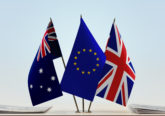On Twitter, conversations around Scotland’s independence, dampened momentarily by a failed referendum in 2014, have been reinvigorated with the advent of Brexit. This article examines how public sentiment towards Scottish independence varies across the United Kingdom’s four constituent nations (England, Wales, Northern Ireland, and Scotland) by analyzing tweets made in January of this year in lead up to Brexit.
Perhaps not surprisingly, the majority of tweets totaling 4,462 (71.4%) on the subject were sent from the mainland of Scotland. 1,387 (22.2%) tweets were sent from England, whereas Wales and Northern Ireland have 286 and 212 tweets respectively, collectively accounting for less than 6% of the all tweets (see Figure 1). Despite the significant difference in the volume of tweets, the geographical distribution across each nation (i.e. clustering in urban areas) is fairly similar, making the dataset suitable for a reasonable comparative analysis.

Words used in tweets
Figure 2 showcases the most commonly used words in these tweets by country. The bigger and bolder a word appears, the more often it is mentioned in the posts. The most common words, such as ‘Indiref2,’ ‘Scottish,’ ‘independence,’ and names of nations were removed in order to enable clearer visualization.

There are both similarities and differences between the four nations. Names, such as ‘Boris,’ ‘Johnson,’ and ‘Sturgeon’ are amongst the most commonly used words in all nations. Interestingly, ‘Brexit’ proves highly significant everywhere. This appears to support the idea that anxieties around Brexit may be giving rise to questions about British unity. It is worth remembering that Scotland, along with Northern Ireland, voted to remain in the EU, whereas both Wales and England voted to exit. With Brexit having gone partially through, it is possible that the Scottish National Party’s (SNP) decision to call for a second referendum might depending on how further Brexit negotiations go.
Some commonly used words are distinct to Scotland and Wales due to both nation’s respective independence movements. For example, the word ‘referendum’ in Scotland clearly emphasizes the discussion around the call for another referendum. In Wales, words such as ‘Indywales’ and ‘yescymru’ can be attributed to the rising nationalist attitudes.
Despite the Welsh having generally supported Brexit, it appears that the momentum for Scottish independence may have stirred up Wales’ too. For example, one of the most re-tweeted tweets in Wales expressed a very positive view of the Scottish independence, completing the tweet with ‘yescymru’. Whilst there was no such sentiments in Northern Ireland and England, the word ‘rejects’ was found to be significant in both nations. This word was mostly used to express negative sentiments about the idea of Scottish independence.

Emotions expressed in tweets
Further sentiment analysis was used in order to discover the emotions expressed in these tweets. First, I performed a binary classification of the tweets in each country into positive or negative sentiment. Wales and Northern Ireland appear to have more positive sentiments (69% and 51%, respectively), compared to the negative sentiments (31% and 49%, respectively). On the other hand, both England and Scotland have more negative sentiments (58% and 53%, respectively) compared to positive (42% and 47%, respectively) (See Figure 3). The results for Scotland, in particular, appear to contrast a YouGov poll, published on the eve of Brexit, which has support for a second referendum in the lead for the first time since 2015, by 51% to 49%. The contrast between the sentiment based on tweets and the YouGov poll may be due to the difference in the demographics, with younger citizens (who use Twitter more) generally in favor of both the British union and staying in the EU.

Figure 4 provides further insight into a range of common human sentiments, such as trust, surprise, and joy present in tweets about Scottish independence. Generally speaking, the patterns across all four nations are comparable. Most notably, the figure shows similar levels of ‘fear,’ ‘joy,’ and ‘sadness’ across all four nations. ‘Anticipation’ and ‘trust’ are the two most expressed emotions, with Wales showing slightly higher percentages in both categories, while also showing the smallest level of anger on the subject. This appears to further highlight the fact that the discussion surrounding a second Scottish referendum on Twitter may be stimulating talk of Welsh independence. ‘Disgust’ is the least expressed sentiment relating to the subject across all nations.
In conclusion, this article highlights the value of new big data sources, such as Twitter, in gaining fresh insights into discussions around key political issues, such as the Scottish Independence referendum. There are three key take away messages from the results presented. First, Brexit might have contributed to elevated calls for a second Scottish independence referendum. Second, discussion around another Scottish independence referendum might have energized similar political movements in other parts of the UK, particularly Wales. Thirdly, sentiments expressed in relation to the subject of a second Scottish referendum across the four UK nations are mixed, but many Twitter users in Wales appear to have an overwhelmingly positive view of the political issue. In closing, as the Brexit agreement progresses, these analytical results suggest that the UK’s fragile devolution arrangement may be increasingly vulnerable.




